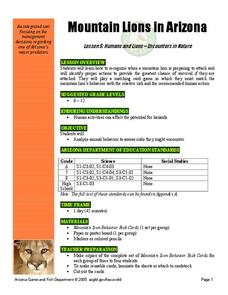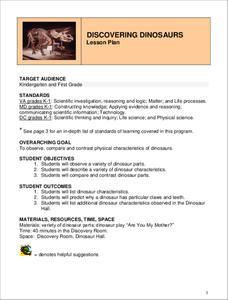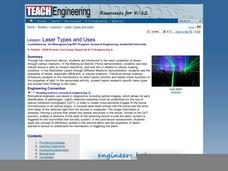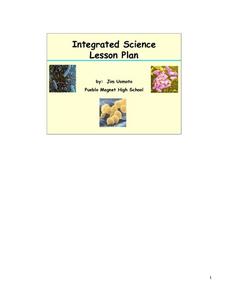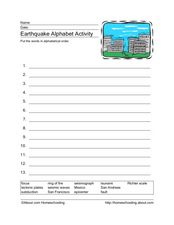Curated OER
Mountain Lions in Arizona Lesson 5: Humans and Lions - Encounters in Nature
Fledgling felinologists are taught how to recognize when a mountain lion is preparing to attack. They identify proper actions to provide the greatest chance of survival if they are attacked. Learners play a matching card game in which...
Curated OER
What Does the Sun Give Us?
Pupils study the sun and how solar energy works. To learn about renewable energy, they complete a lab activity using a pizza box as a solar heater. Quite clever!
Curated OER
How Do Plants and Animals Change the Environment Around Them?
If you have elodea and snails in your classroom aquarium, or if you have access to a pond with these organisms, your young biologists can set up a controlled experiment to determine how certain ecosystems respond in light and dark...
Curated OER
Elephant Seals - Evolution
Students create posters or skits based on specific adaptive characteristics of elephant seals.
Curated OER
Flood Control: Environmental History
Students examine the painting, Spring on the Missouri. They role-play and discuss floods and flood control from the views of an environmental lobbyist and a farmer.
Curated OER
Discovering Dinosaurs
Students investigate the physical characteristics of dinosaurs. They participate in a puppet show, take a field trip to a dinosaur museum, and compare/contrast dinosaur characteristics at the museum.
Curated OER
Sorting
Students examine the concept of organization. In this library skills lesson, students practice ordering and sorting skills by playing the Flood Game.
Curated OER
Comparing the Amoeba to Paramecium
This laboratory activity is valuable practice in comparing features of different organisms. You could use it to introduce junior biologists to protozoans. The materials and procudures for the learners are simple, and analysis...
Curated OER
Sheffield Island Adaptation Activity
You don't have to visit The Maritime Aquarium to use this plan, but you would need to find a location where a variety of bird species live, re-write the activity worksheet to incorporate the local species, and purchase field guides for...
Curated OER
Identifying Birds
Eighth graders identify and name birds in their school yard by comparing and contrasting pictures of 12 common birds in the Phoenix metro area using the Ecology Explorers Protocol. They formulate questions based on observations that lead...
Curated OER
Laser Types and Uses
Students examine the properties of lasers and research their types and uses. In this laser lesson students view several demonstrations.
Curated OER
Nesting Bird
Your class will love this lesson! Learners discuss the birds they have seen in their region and create a collage. The collage contains a picture of a tree, a bird, and the bird's nest. As an extension, they can learn about the specific...
Curated OER
Marine Debris
Students perform experiments to examine if debris float, or blow in the wind. The effects of these characteristics on the marine debris are then discussed. They determine how a material can influence what becomes marine debris.
Curated OER
Scientific Method Unit: Bacteria
Students discover how to apply the steps of the inquiry process through the study of bacteria. Working in groups of four, they cooperatively read an article about bacteria and complete a graphic organizer. Group members share with others...
Curated OER
Cell Game
Make a prototype of a game based on cell biology. Researching game design and working in groups to create a game will activate knowledge of cell biology. The review task will help students learning as they test out the games and their...
Curated OER
Introduction to Bacteria
Beginning biologists survey several websites to learn about the types, structure, motility, feeding habits, and reproductive methods of bacteria. All websites are linked to the lesson plan, so you can have individuals access it and click...
Curated OER
Earthquake Alphabet Activity
In this earthquake activity activity, students examine 10 earthquake-related terms and then put those terms into alphabetical order.
Curated OER
Where There's Smoke
Students explore technology and how it can be used to bring about change in other cultures. For this investigative lesson students complete several activities using technology.
Curated OER
Down in the Dumps
After an introduction to municipal sludge, middle school ecologists consider the pros and cons of dumping in the Hudson River Canyon. The class is split into two groups: one to debate in favor or dumping and one to debate against the...
Mathematics Vision Project
Quadratic Equations
Through a variety of physical and theoretical situations, learners are led through the development of some of the deepest concepts in high school mathematics. Complex numbers, the fundamental theorem of algebra and rational exponents...
State of Victoria
Making Healthy Choices, Making Healthy Food: PreK-3 Curriculum Support
From examining how much sugar is in foods and looking at fruit and vegetable varieties to making mini rainbow tarts, this unit provides youngsters with a fabulous overview of proper nutrition and eating habits.
Institute of Electrical and Electronics Engineers
Try Your Hand at Nano
Fascinating reading about nanotechnology, nanoscale properties, and liquid crystals precedes a fun activity for young engineers. They measure their hands in nanometers, research, and then investigate how heat effects a sheet containing...
Institute of Electrical and Electronics Engineers
Get it Write
In an effort to practice engineering design, STEM classes break out into teams and endeavor to make a working ink pen. To prepare, they read about writing implements through history, patents, and viscosity of liquids. Armed with this...
Curated OER
Mussel Movements
Learners consider the impact of invasive species on local environments. In this ecology lesson, watch the video, Arizona Wildlife Views, which focuses on invasive species. Students develop vocabulary, relate to meaningful comprehension...
